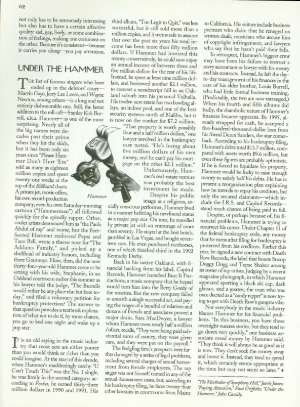The New Yorker, August 26, 1996 P. 62
Talk story about rap singer Hammer & his bankruptcy woes... The list of famous singers who have ended up in the debtors' court--Marvin Gaye, Jerry Lee Lewis, and Wayne Newton, among others--is a long and not entirely dishonorable one. Still, the latest addition to the roll call--Stanley Kirk Burrell, a.k.a. Hammer--is one of the most surprising... It has only been 6 years since "Please Hammer Don't Hurt 'Em" sold as man as 18 million copies and spent 21 weeks at the top of the "Billboard" charts.... According to "Forbes" he earned $33 million in 1990 and 1991. It seems safe to assume that over the past 6 years his total income has been more than $50 million. If Hammer had invested this money conservatively, he could now enjoy an annual income of between $3 and $5 million for the rest of his life. Instead, he spent at least $9 million, and borrowed another $2.1 million, to convert a nondescript hill in an Oakland suburb into his personal Valhalla... The property is now on the market for $7.2 million... His Bust It Productions music company failed to unearth a single successful act... According to his bankruptcy filing, Hammer's debts total $13.7 million, compared with assets worth $9.6 million, but even these figures are probably optimistic. If he is forced to liquidate his property, Hammer would be lucky to raise enough money to satisfy half his debts.... Earlier this year, he signed a new contract with Death Row Records.. Judging by a recent magazine photograph, in which Hammer appeared sporting a black ski cap, dark glasses, and a goatee, the man who was once decried as a "candy rapper" is now trying to get with Death Row's gangsta vibe. Not everyone in the music industry blames Hammer for his financial problems. "In this business, you have these overnight success stories, but they tend to go down very quickly," one business associate owed money by Hammer said. "They think it will always be as good as it is now. They don't sock money away and invest it. Instead, they tend to spend it, which certainly seems appropriate at the time but may not seem so later."


